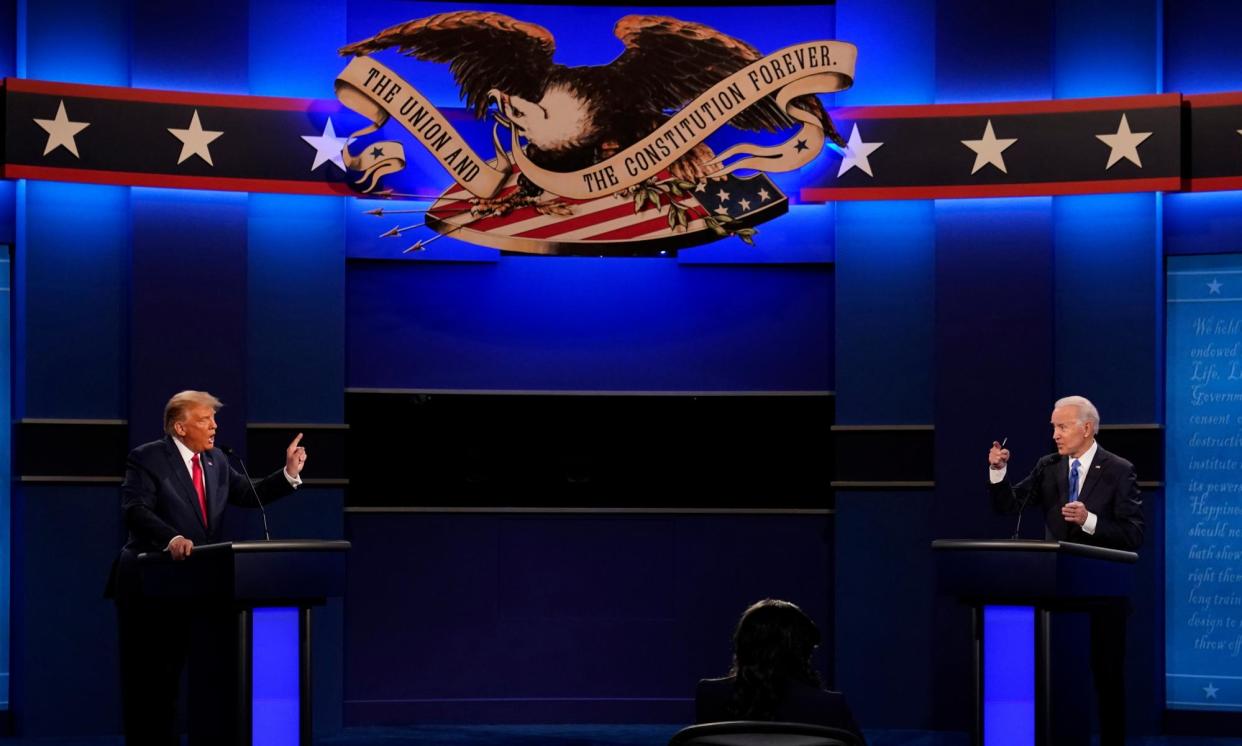No props, no notes, no audience – but Trump-Biden debate will have ad breaks

“Will you shut up, man?” It was hardly oratory worthy of Abraham Lincoln, but Joe Biden’s primal plea in the face of relentless interruptions and heckling from Donald Trump provided a defining soundbite of the 2020 presidential debates.
The two will face each other again on Thursday for the first of two head-to-head debates for the 2024 campaign, under new rules designed to prevent matters degenerating as they did four years ago. The US president and the former president will meet in a TV studio without the presence of a partisan audience, which some saw as an essential ingredient of Trump’s rabble-rousing approach. And to counteract the repeated butting-in that so irked Biden, the candidates will have their microphones muted when they are not speaking.
But the debates are also the first in decades to be held entirely by commercial TV networks – including two advertising breaks – and without the oversight of the Commission on Presidential Debates, the long-established, independent, non-partisan body that has long governed the debate rules. Some critics say they fear that commercialising the process could lead to less substantive, shorter answers, geared more to generating conflict and soundbites than enlightening voters.
The verbal volleys in 2020 between Biden and Trump, under the Fox News moderator Chris Wallace, became so vitriolic that the CNN presenter Dana Bash was prompted, live on air, to describe the event as “a shitshow”. Earlier this year, both campaigns chose to circumvent the Commission on Presidential Debates, which had overseen presidential debates since 1988, and on 27 June, Bash and her CNN co-presenter, Jake Tapper, will have a chance to improve on Fox’s effort when they preside over the first debate in Atlanta. A second debate will take place on 10 September, to be hosted by ABC.
No props or prewritten notes will be allowed on stage. Candidates will be given a pen, a notepad and a bottle of water.
The decisions to switch off a candidate’s microphone when it is the opponent’s turn to speak, and to exclude a partisan audience, have been taken in an effort to reduce the theatrical gladiatorial bloodsport element that has threatened to overwhelm recent debates.
Some critics said the lack of oversight from the CPD, as well as the inclusion of two commercial breaks during the 90-minute event, undermined the nature of the debate.
“The introduction of commercial breaks will fundamentally change what makes a debate a debate, since the candidates will constantly be able to stop and regroup,” Clea Conner, chief executive of Open to Debate, a research group that has tracked presidential debates over recent decades, told Politico.
“Even though there will be only two commercial breaks this time, once we deem them acceptable it’s a classic slippery slope; how many will there be next time, and the time after that?
“[Candidates’] arguments will have to be shorter, truncated for the commercial clock, and will result in more outrageous interactions to bump ratings.” Without the presence of an independent broker such as the CPD, she argued, it would lead to “pure political theatre”.
Open to Debate’s report into the deterioration of debate quality attested to the need for drastic format changes from 2020, in order to arrest a decline in moderator control and candidate decorum.
While there were just three interruptions across three debates in the 2004 election between George W Bush and John Kerry – administered by the CPD – the first 2020 Trump-Biden encounter witnessed 76, the group noted. However, the second debate saw just four interruptions, after non-speakers’ microphones were muted following criticism of the chaos three weeks earlier.
Steven Fein, a professor of psychology at Williams College in Massachusetts, who has studied the psychological dimension of presidential debates, said excluding a loudly cheering live audience was “rational” and “good for democracy”.
“[It] will reduce significantly the chances that the focus of the debate will be not on what is actually said, but on all this stuff around it – the reaction of the audience and playing to the audience,” he said. “I think that changes what the candidates are likely to do.
“It also changes what the audience at home takes away from the debate, what they remember, what plays the news the next day – all based on the audience reaction. Because the audience reaction may or may not be valid.”
He warned, however, that the commercial TV networks may jettison the new approach “because it makes for less exciting television”.
The candidate with more to lose in the controlled, low-key environment is probably Trump, according to Tammy Vigil, associate professor of communications at Boston University.
“He tends to feed off of the energy of a crowd,” she said. “He’ll lose some of his energy by not having a crowd to feed off. The other part that’ll probably change is that the candidates will be more apt to speak to the cameras directly.
“I think that will improve the overall feel of the debate for television viewers because it’ll feel like the candidates are speaking more directly to them.”

 Yahoo News
Yahoo News 
